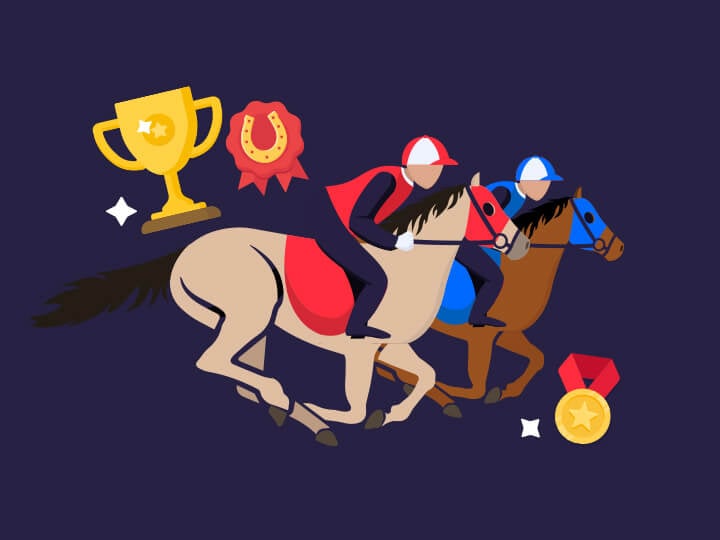Cheating has an incredibly negative connotation … or so we thought. Cheating in the gaming world may actually have its own unique definition. After speaking to more than 1,000 gamers across America, we now have an in-depth understanding of exactly what constitutes cheating in a game, how it is perceived, and what people believe should happen afterward.
If you’re a gamer, you likely have some experience with cheating—either your own or that of others. To see how gamers believe these situations should be handled, keep reading. You’ll also find out people’s favorite cheats, how cheating has impacted their overall experience, and even how console preference relates to cheating frequency.
Key takeaways
- Seventy-seven percent of gamers thought it was perfectly acceptable to cheat.
- Gamers selected the Age of Empires II Shelby Cobra cheat as the greatest cheat of all time.
- PC gamers were perceived to be the biggest cheaters, but PlayStation users admitted to cheating the most.
Cheating in the gaming world
First, we gave respondents the chance to share exactly what they thought constituted cheating when playing video games. They also shared how acceptable or unacceptable cheating was both in general and specific scenarios.
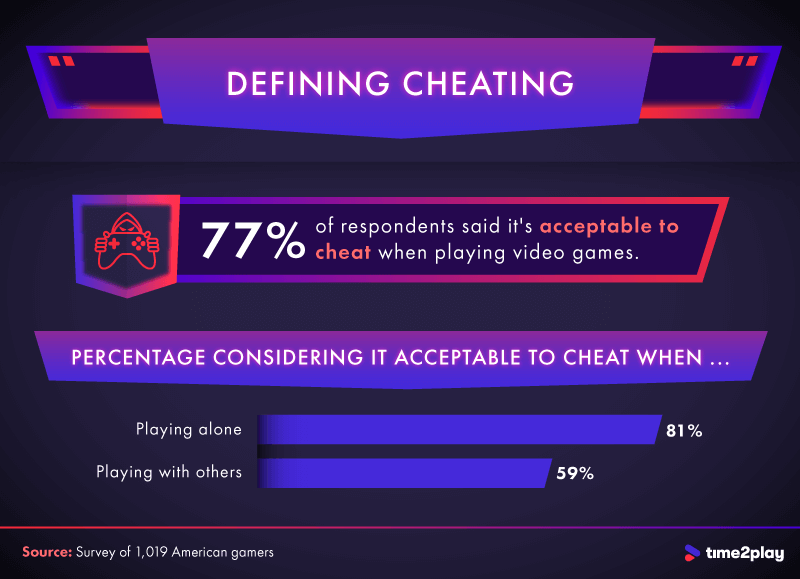
The majority of gamers did not seem to have an adverse view of cheating. More than 3 in 4 players agreed that cheating was acceptable in video games. They were even more likely to feel it was OK when playing alone (81%).
So what exactly did they have in mind when they spoke about cheating? Exploiting glitches in the game and looking up answers online were considered cheating by most respondents. Just a small 4% said it was unacceptable to look answers up online.
There were some moral barriers gamers were less likely to cross. For example, gamers felt it was best to try three or four attempts at something before cheating or perusing solutions online. Gamers were also less likely to consider cheating acceptable when playing with others, as opposed to playing alone.
Cheating catalysts
Moving into the specifics of cheating, we wanted respondents to share exactly how they were cheating and why. This section of our study reveals the most common cheats and the top reasons for using them.
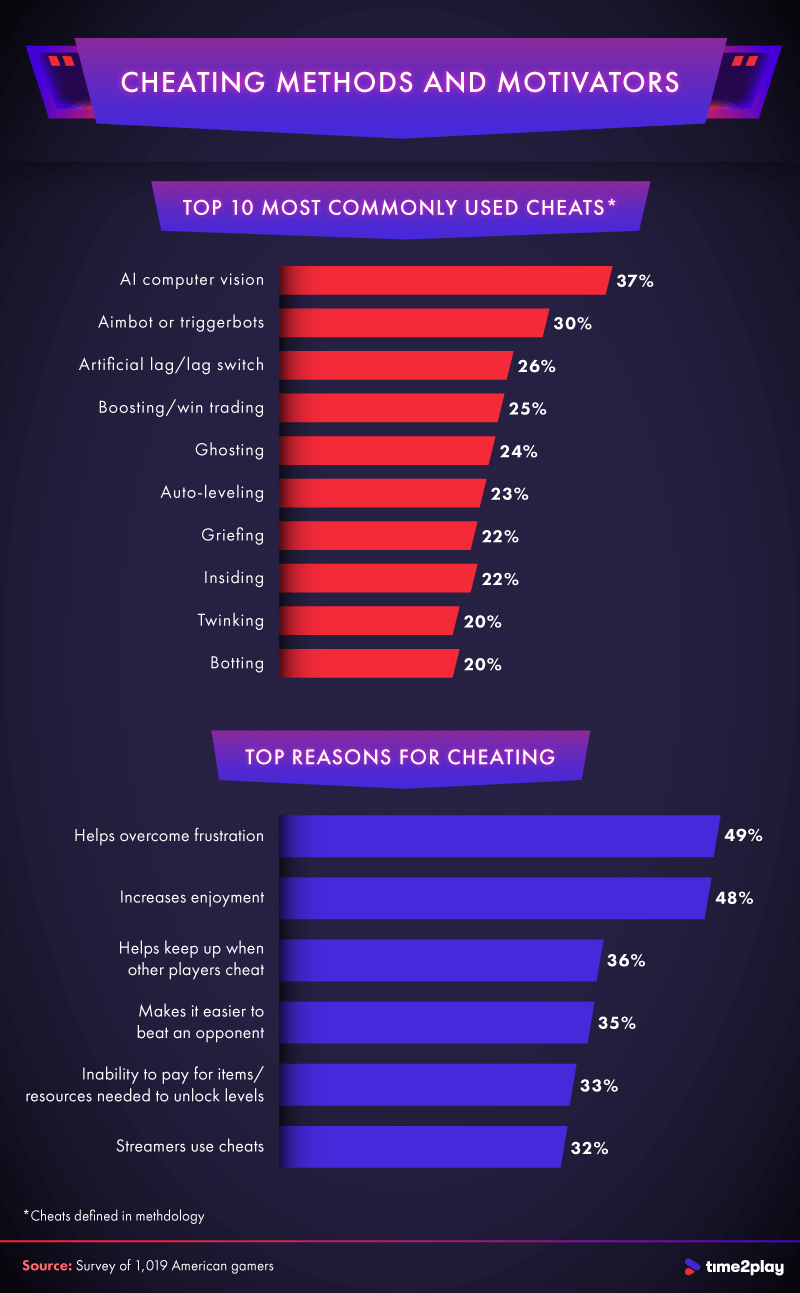
The most popular way for gamers to cheat was to use AI computer vision. As these images demonstrate, AI computer vision can be used to detect and pinpoint enemy location on the screen to help the player know exactly where to shoot. Of course, there are many other applications for this technology, which is likely part of the reason why its usage is so widespread among cheaters. Aimbots were also employed by nearly a third of gamers. Similar to the example for AI computer vision, aimbots are primarily used for first-person shooter games to help people automatically lock on to their targets.
Countering these types of cheating with more cheating, 26% of gamers admitted to using artificial lags and lag switching, which enable them to hop around on the map and avoid being targeted. Other common cheats included ghosting (24%), which shares privileged information with other players, and auto-leveling (23%), which automatically generates new levels for players.
If you’re wondering why cheating is so prevalent in video game culture, most people who have done it agree that it actually makes the game more fun and helps them overcome frustration. More than a third just want to be able to keep up with other players using cheating hacks. That said, wanting to win was still a common motivator for cheating, as evidenced by 35% of respondents.
Those who cheat the most
Yes, cheating across games is seemingly widespread, but the behavior was not evenly distributed across demographics, games, or consoles. This section of our study looks at the likelihood of cheating across genders and generations, as well as how statistics change depending on the particular game or console used.
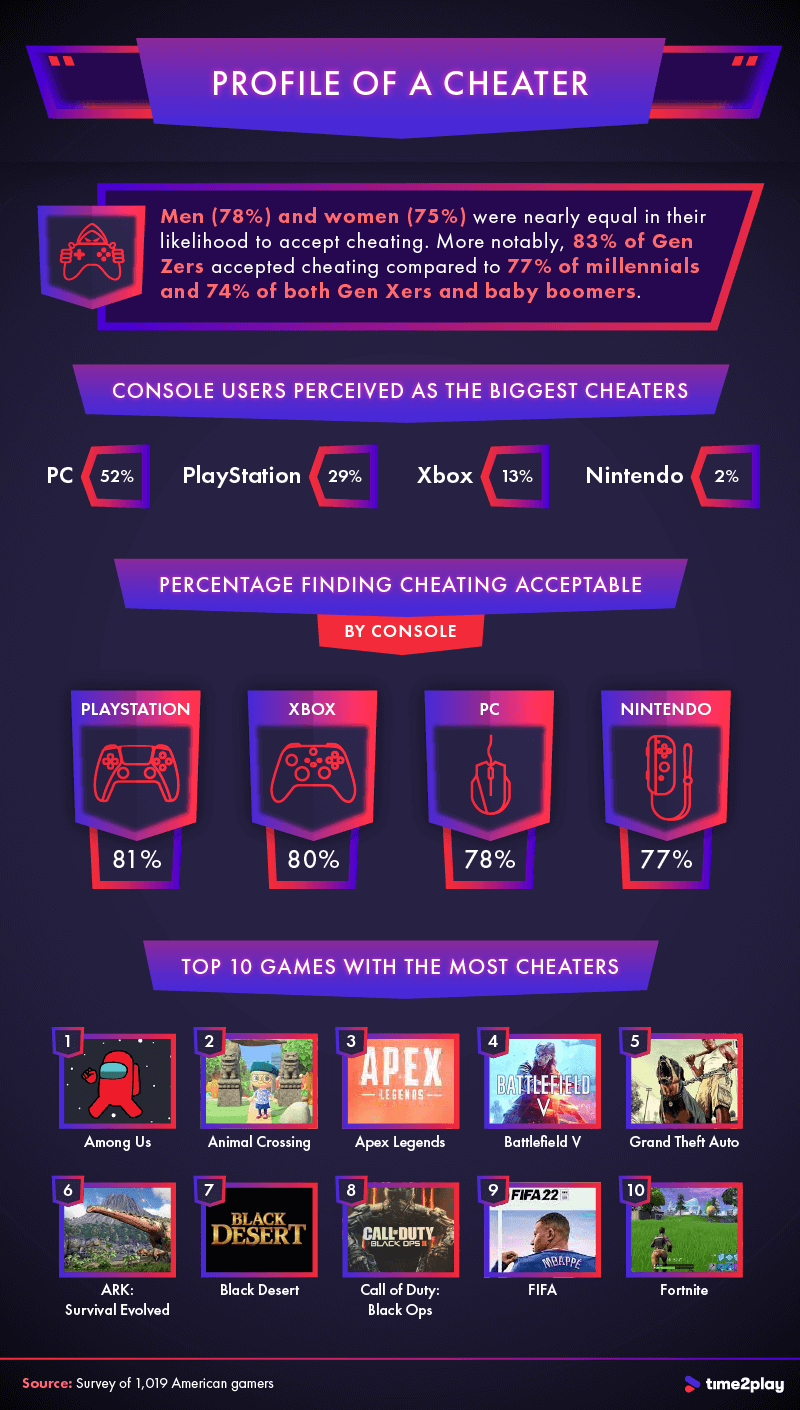
While the two primary genders ranked similarly in terms of their propensity to cheat, generations demonstrated a greater difference in attitudes. The younger the respondent, the more likely they were to cheat. Gen Zers accepted cheating 83% of the time, compared to 77% of millennials and 74% of Gen Xers and baby boomers.
Nintendo players were perceived as the group least likely to cheat, and those perceptions reflected reality with Nintendo players also reporting the lowest levels of accepting cheating. Yet, while people who used their PCs were perceived as the most likely to cheat, they actually ranked second lowest when it came to approving cheating. When it came to individual games, Among Us had the most cheaters.
The greatest of all time
Not all cheats are created equal, according to gamers, with some making their list of “the greatest cheats of all time.” In first place was a cheat for the game Age of Empires II called the Shelby Cobra. Age of Empires is a real-time strategy (RTS) game. Players begin with a small town and economy in the Feudal Age and are expected to compile resources and expand their territory. The Shelby Cobra cheat helps players send dozens of “Cobra cars” to siege and attack another territory. The cheat does have an interesting visual effect, juxtaposing modern vehicles against a feudal background.

The time travel cheat in Animal Crossing was also a crowd favorite, coming in second overall. Even Forbes released an article explaining how to use it, stating that “cheating in video games is a perfectly reasonable thing to do.” Animal Crossing adheres to a normal clock where the sun rises and sets in real time. To avoid this real-world barrier, all one needs to do is use a simple cheat involving a console’s date settings. Other crowd favorites included “the blood code” in Mortal Kombat and console commands in Minecraft.
Cheating: the fallout
Even though it’s been well established that cheating is considered fairly acceptable in the gaming world, this is not to say it has no impact or ramifications. The next section of our study asks respondents how cheating impacted their own experience of the game.
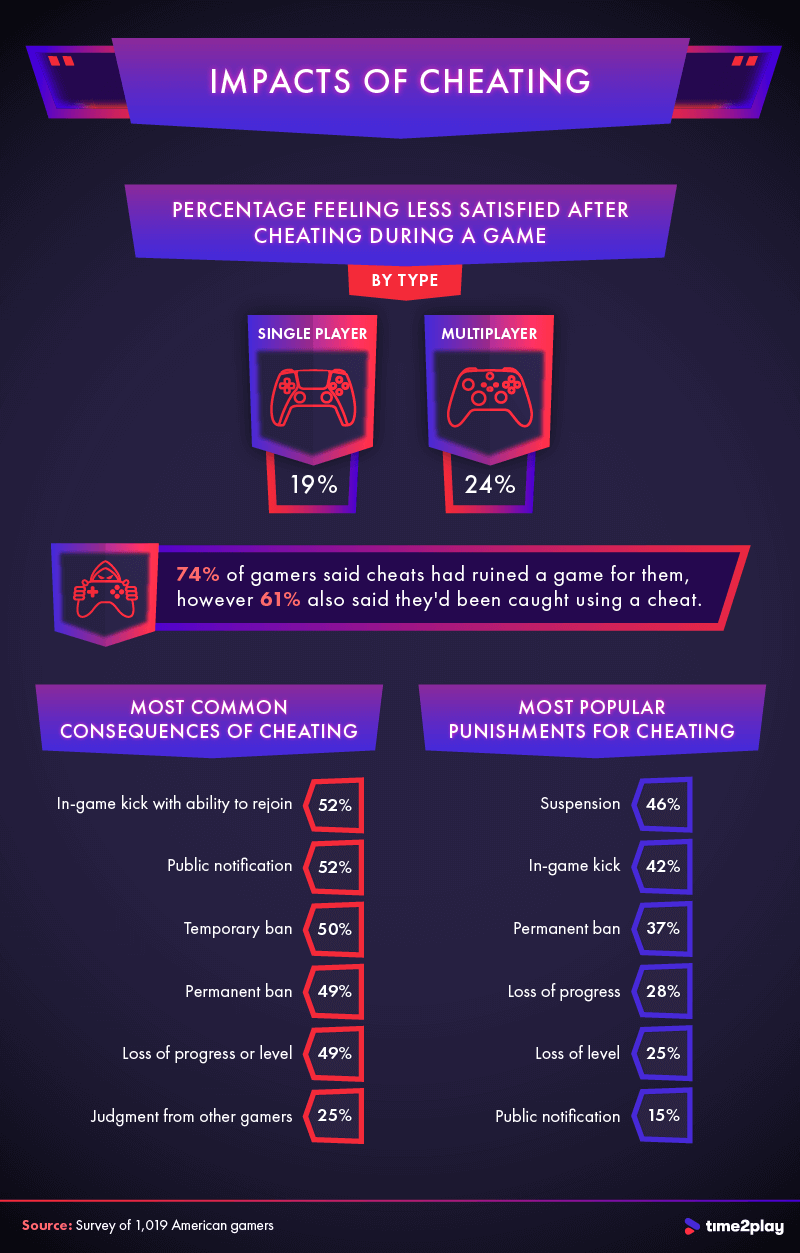
Satisfaction levels suffered for 19% of single player gamers and 24% of multiplayer gamers after cheating while playing—and that was according to the cheaters themselves! Even though it may temporarily relieve frustration or help win a battle, there is a chance, especially in a multiplayer game, that cheating makes the game less enjoyable. Even worse, the vast majority (74%) said that cheating had completely ruined a game for them. Xbox players were the most likely to say that cheating had ruined a game for them at 81% followed by PlayStation gamers at 78%, 76% of Nintendo players, and 75% of PC users.
The most common consequences of cheating were, in tied first place, being kicked from the game (albeit with the ability to rejoin) and receiving a public notification of being caught cheating. People were not always allowed back in, however: 50% of the time cheating players experienced a temporary ban and 49% of the time a permanent ban. When we asked what players wanted to happen to cheaters, more than a third wanted this permanent ban to occur. However, the highest percentage of respondents felt a simple suspension was more appropriate (46%).
Consequences for cheating in professional gaming
Predictably, the implications of cheating change when money is on the line. The last section of our study looks at how gamers believed professionals should be punished for cheating.
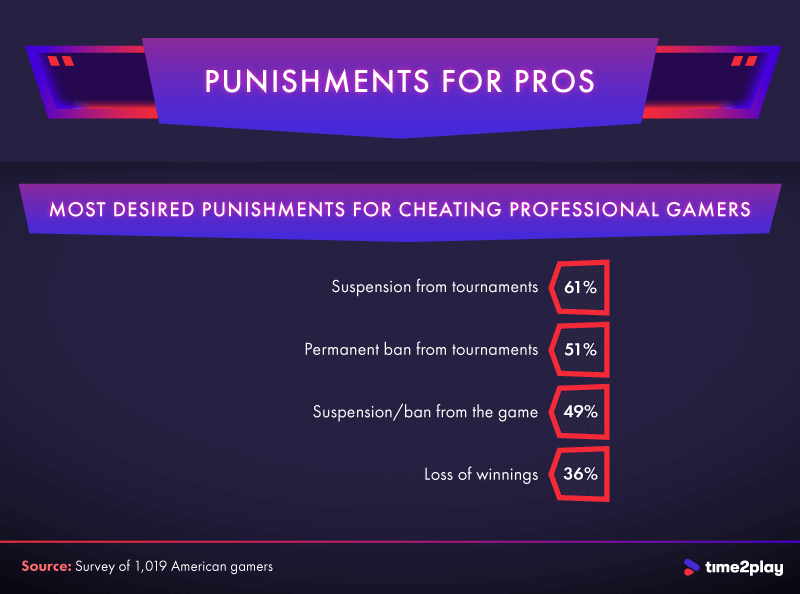
The suggestion of a permanent ban became much more popular: 51% of respondents thought this was an appropriate punishment for a professional gamer caught cheating. Even more (61%) felt they should at least be suspended from tournaments, while just a tiny 2% felt there shouldn’t be any punishment at all.
In early November, a Call of Duty: Vanguard tournament with a prize of $7,000 was disrupted when a player was discovered cheating. The gamer was disqualified from the tournament and responded by posting the names of 14 other pro Call of Duty players and accused them of cheating as well. All in all, cheating seems to be more controversial among the pros than amateurs.
A fair gaming world
Although a completely fair gaming world would be devoid of any cheating, most gamers agreed that cheating to some extent was completely acceptable. Most respondents not only admitted to cheating but supported the concept overall and even had a list of their personal favorite cheats. Explanations for doing so included making the experience more fun and less frustrating.
That being said, most gamers agreed that cheating was much less acceptable at a professional level. The suggested punishments became more severe, implying a more stringent moral code when money is on the line. That makes us happy, of course, as it is the core mission of Time2play to provide gamblers with a chance to avoid the cheating, and truly find the honest and best online casinos or the best sports betting sites out there.

Methodology and Limitations
We surveyed 1,019 American gamers. 618 respondents were men, 395 were women, and six respondents were nonbinary. Additionally, there were 194 baby boomers, 270 members of Generation X, 295 millennials, and 260 Gen Zers. For console breakdowns, there were 807 PC users, 685 respondents using a PlayStation, 405 respondents gaming on Xbox, and 290 Nintendo users. Respondents were able to choose more than one console.
This study uses self-reported survey data. Self-reporting may cause several limitations, such as telescoping, selective memory, and exaggeration.
Fair Use Statement
How do you feel about cheating in games? If you think this research and analysis would be of interest to your friends or helpful for your audience, you are welcome to share it. Just be sure you link back to this page and that your purposes are noncommercial.
Top picks

Trending blogs

As tensions rise between Philadelphia 76ers All-Star swingman Ben Simmons and head coach Doc Rivers, we turned to body language expert Judi James to see if she could figure out what's fueling his estrangement from the team.

For those who aren’t quite up to date on this particular cryptocurrency phenomenon, welcome to the world of NFTs. To put it simply, they are one-of-a-kind, verifiable digital assets that can be collected and traded on online crypto marketplaces. Equally as entertaining are online casinos for real money.
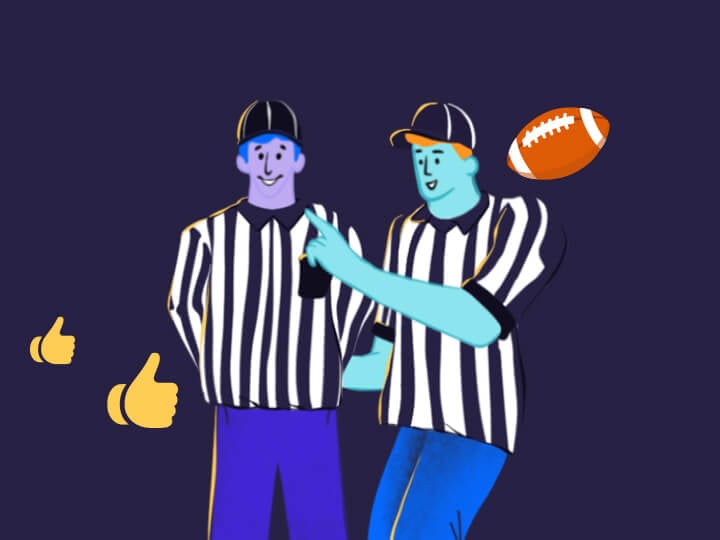
Having certain biases are inevitable; they’re one of the many traits that make us unique. In some professions more than others, people are often provided the opportunity to use their creative discretion to make crucial and impactful decisions. For professional referees in the NFL, choosing to penalize (or not) can oftentimes heavily influence game or even season outcomes. For this reason, to what extent their individual biases impact their decision-making is a particularly important issue for teams, fans, and sports bettors alike.

As the NFL’s 102nd season kicks off, we wanted to know if and why home-field advantage really exists. So we examined interesting features of 12 of the NFL’s most unique stadiums to see what sets them apart from the competition.





